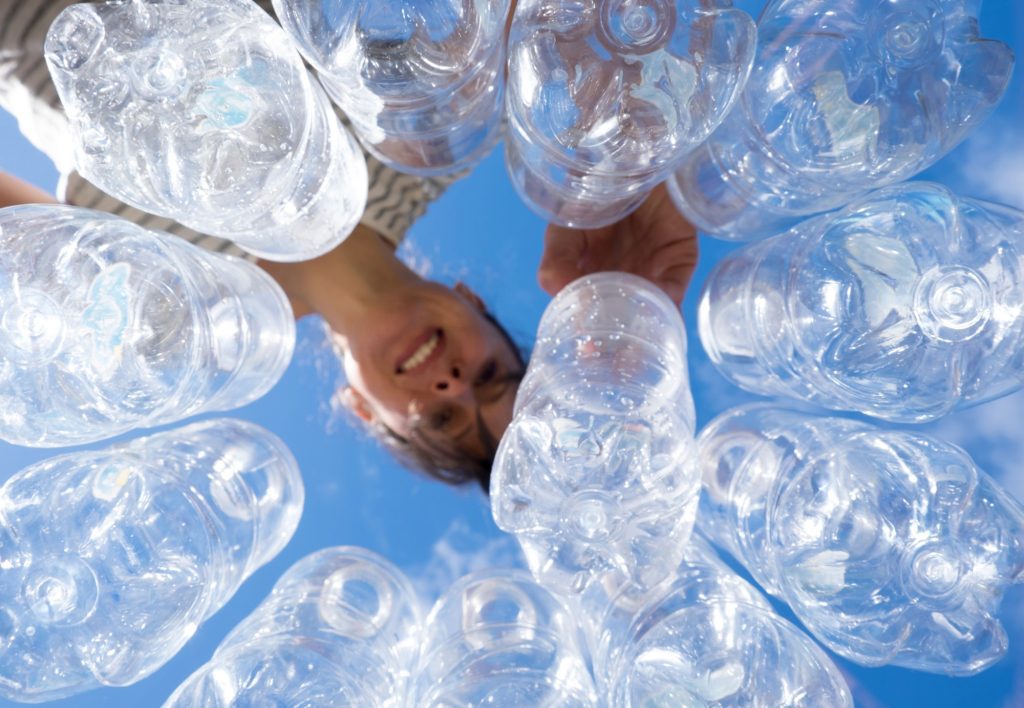When I explored this year’s Earth Day theme of “Planet vs. Plastics,” I discovered more than I expected. I knew from the start that plastic — the large pieces that we can see littering our communities, piling up in landfills, and clogging our oceans — is a visible, tangible problem. I had no idea how widespread and deep-seated plastic has become in our environment.
When plastic breaks down, it just fragments into smaller and smaller pieces; it never disappears. This means that microplastics (MP) — tiny plastic particles that are less than 5 millimeters in size — are now present in our drinking water and food supply. That convenient, pristine-looking, single-serve bottle of water you grab at the store? In a study released in January of this year, researchers who examined five samples of three different bottled water brands found an average of around 240,000 microplastic particles per bottle.
Our oceans are also filled with MP. Researchers estimate that an average person consumes about nearly 54,000 particles of MP annually from seafood alone, equivalent to 17 credit cards. (https://tinyurl.com/yaux4bpa)
How do these particles get into our food supply? The following is from earthday.org (https://www.earthday.org/you-are-what-you-eat-plastics-in-our-food/)
“Industrial discharge of poly-fluoralkyl substances (PFAS) into waters contaminates the sludge used to fertilize crops. Microplastics also enter your body through the plastic packaging found on almost everything in the grocery store.
“Fruits and vegetables absorb microplastics through their root system and they enter seeds, leaves, and fruit depending on the microplastic’s size. Apples and carrots are the most contaminated fruit and vegetable.
“Researchers have found microplastics damage human cells, decrease reproductive health, and disrupt the endocrine system. Microplastics also act as a vessel for harmful substances to enter the body as they can absorb chemicals linked to cancers and weakened immune systems.”
There’s more. The PFAs mentioned above? Referred to as “forever chemicals,” these substances are now part of the water supply virtually everywhere. The toxins are widespread and long lasting in the environment and have been implicated in certain types of cancer as well as low birth weight and liver disease.
The chemicals are used in manufacturing a multitude of products, for instance non-stick cookware, waterproof clothes, paints and varnishes, artificial turf, and — in a bizarrely twisted way — in compostable food service ware.
Amid all of this, I found some better news. The headline of an article* in The Daily Local News on April 11 caught my attention: “Biden administration sets first-ever limits on ‘forever’ chemicals in drinking water.” The limits call on water utilities to “reduce [PFAs] to the lowest level they can be reliably reassured…The rule is the first national drinking water limit on toxic PFAS…which are widespread and long lasting in the environment.”
On reading the article I was struck by how much we don’t know about what’s at work in our environment and how much of it is beyond our individual control. There are, however, things that you can do to reduce the amount of plastic that goes into your system. For instance, things like storing and reheating foods in glass or ceramic containers and switching from plastic water bottles and travel mugs to those made of stainless steel or glass.
You can also back transformation in how you vote, both at the ballot box and at the shop. “Voting with your wallet” is influential. Remember when organic foods were seen as a trend that wouldn’t last? When you had to visit a health food /natural foods store to find them? When Fresh Fields (now Whole Foods) was the unusual new addition? Fast forward to today when most grocery stores have whole sections devoted to organic foods. Together, we really do make a difference. Together we contaminate our world. Together, we can clean it up.
Note: for some additional tips on avoiding microplastics in food go to https://europlas.com.vn/en-US/blog-1/how-to-avoid-microplastics-in-food
*Michael Phillis for the Associated Press, April 11, 2024
Pam Baxter is an keen organic vegetable gardener who resides in Kimberton. Direct e-mail to [email protected], or send mail to P.O. Box 80, Kimberton, PA 19442.









